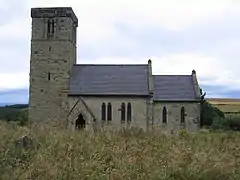| Wharram-le-Street | |
|---|---|
 St Mary's parish church | |
.svg.png.webp) Wharram-le-Street Location within North Yorkshire | |
| OS grid reference | SE8665 |
| Civil parish | |
| Unitary authority | |
| Ceremonial county | |
| Region | |
| Country | England |
| Sovereign state | United Kingdom |
| Post town | MALTON |
| Postcode district | YO17 |
| Dialling code | 01944 |
| Police | North Yorkshire |
| Fire | North Yorkshire |
| Ambulance | Yorkshire |
| UK Parliament | |
Wharram-le-Street is a village and former civil parish, now in the parish of Wharram, in North Yorkshire, England.
Until the 1974 local government reorganisation Wharram-le-Street was part of the East Riding of Yorkshire. It was then part of the Ryedale district between 1974 and 2023.
The village is on the B1248 road between North Grimston and the boundary with the present East Riding of Yorkshire unitary authority.
The Church of England parish church of St Mary is late Anglo-Saxon.[1] The nave and lower part of the west tower were built in the early or mid-11th century, in the last decades before the Norman conquest of England.[1] The top of the tower is slightly later, representing the Saxo-Norman overlap architecture of the late 11th or early 12th century.[1] The chancel arch is pure Norman, the north aisle was added in the 14th century and the chancel was rebuilt in 1862–64.[2]
St Mary's is now a Grade I listed building.[3] The parish is now part of a joint benefice with the parishes of East Lutton, Helperthorpe, Kirby Grindalythe, Weaverthorpe and West Lutton.[4]
History
The affix "le-Street" in the toponym refers to the fact that the village is beside the course of a former Roman road. The Domesday Book of 1086 records the manor as Warham. About 1 mile (1.6 km) south of the village is the deserted medieval village of Wharram Percy. Wharram railway station on the Malton and Driffield Railway served the village from 1853 to 1950.[5] On 1 April 1935 the parish was abolished and merged with Raisthorpe and Burdale and Wharram Percy to form Wharram.[6]
In 1931 the parish had a population of 133.[7]
References
- 1 2 3 Pevsner 1972, p. 367.
- ↑ Pevsner 1972, p. 368.
- ↑ Historic England. "Church of Saint Mary (1149064)". National Heritage List for England. Retrieved 25 October 2013.
- ↑ Archbishops' Council (2010). "St Mary, Wharram le Street". A Church Near You. Church of England. Retrieved 25 October 2013.
- ↑ Butt, R. V. J. (October 1995). The Directory of Railway Stations: details every public and private passenger station, halt, platform and stopping place, past and present (1st ed.). Sparkford: Patrick Stephens Ltd. ISBN 978-1-85260-508-7. OCLC 60251199. OL 11956311M.
- ↑ "Relationships and changes Wharram CP through time". A Vision of Britain through Time. Retrieved 13 September 2021.
- ↑ "Population statistics Wharram le Street CP/AP through time". A Vision of Britain through Time. Retrieved 13 September 2021.
Sources
- Pevsner, Nikolaus (1972). Yorkshire: York & the East Riding. The Buildings of England. Harmondsworth: Penguin Books. pp. 367–8. ISBN 0-14-0710-43-4.
External links
- Wharram-le-Street in the Domesday Book